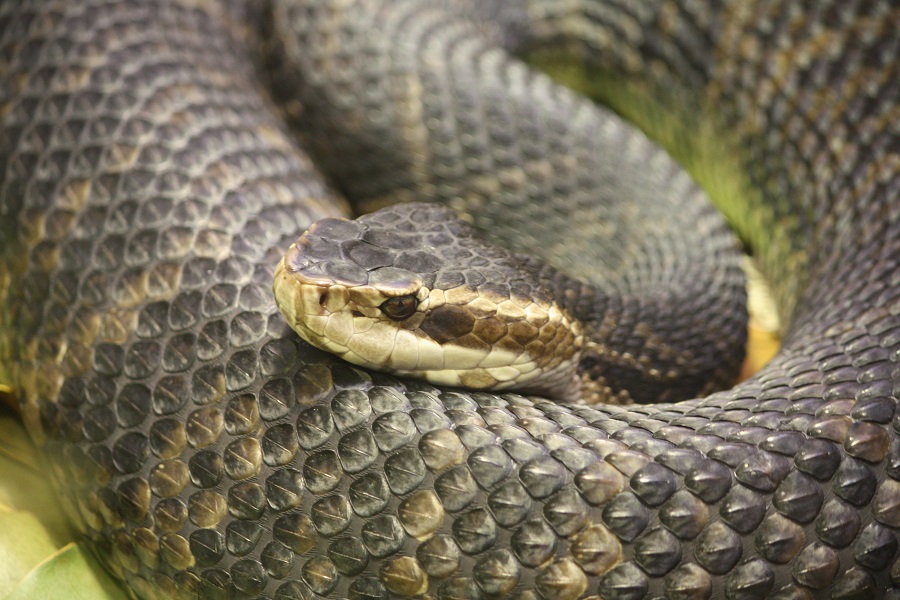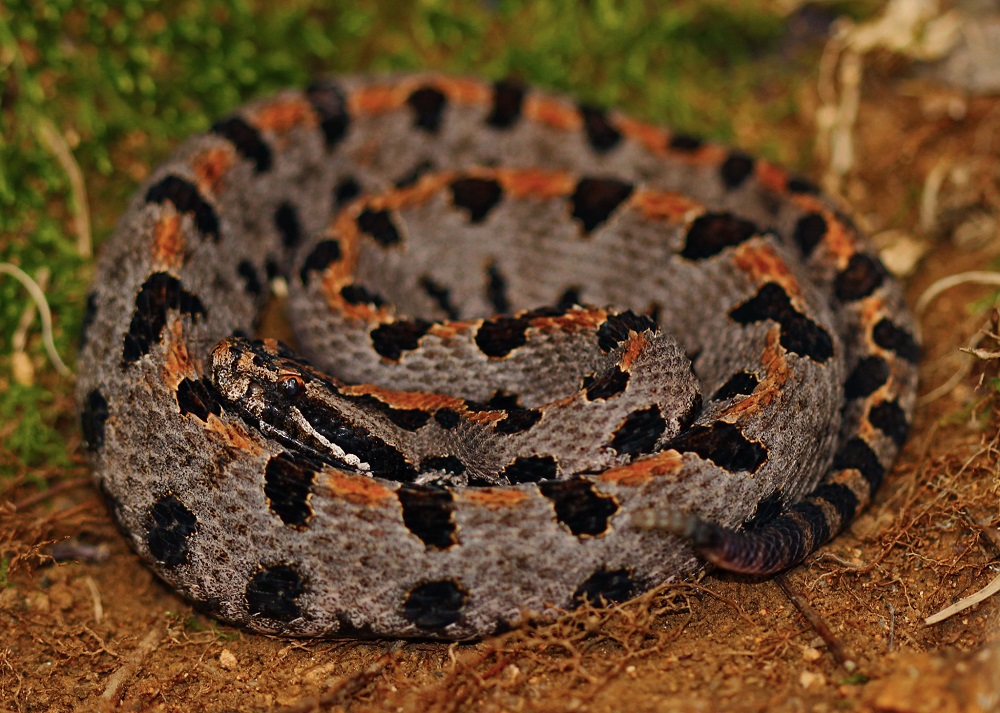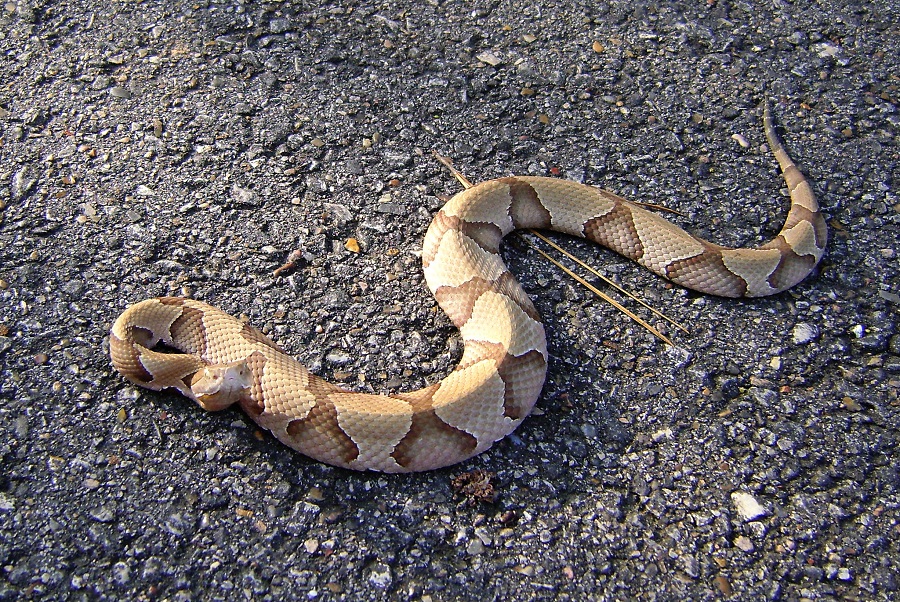Keeping Dogs Safe from Snakes in Florida
A dog is sniffing on a hiking trail one minute and yelping, bleeding, and shaking the next! What should a pet owner do, and how can one prevent unnecessary encounters with poisonous snakes in Florida? A snake bite on dog or cat can be terrifying to experience as a pet parent, so here's what to watch out for and some tips on avoiding these tense situations.
Types of Poisonous Snakes in Florida For Pets
Six common Florida snakes are quite venomous for dogs and humans: coral snakes, copperheads, cottonmouths, pigmy rattlers, Eastern diamondback rattlesnakes and timber rattlesnakes. If your cat or dog bitten by snakes, it's important to connect with a veterinarian as quickly as possible.
Coral Snakes

The old mnemonic "red on yellow kills a fellow" refers to the infamous coral snake. Florida, Louisiana and many of the coastal plains of the Carolinas are home to this snake, which loves to burrow, popping to the surface during rainy seasons. Their neurotoxic venom is one of the most potent in the United States, causing major respiratory failure in as little as 18 hours. They don't spit venom; they hold down their bite to drip venom into the wound. The bite itself may not even cause swelling. But twitching, rapid breathing, salivation and strange movements may correspond with a coral snake bite on your dog. Antivenom, which is not always available given a shortage in 2012, should be administered within a few hours of a bite for it to be effective.
Florida Cottonmouth Snakes

Cottonmouths (or "water moccasins") are infamous for being fairly aggressive (somewhat unfairly), often standing their ground rather than slithering away. These semi-aquatic, typically brown snakes prefer swamps and lakes and are also one of the more common snakes that bite in South Florida. Effects on a dog can be horrible, as these snakes produce cytotoxic venom, destroying the victim's tissue and cause necrosis. The bite itself will normally swell and cause pain. Symptoms may begin to appear in as little as one hour, and quick action is necessary.
Rattlesnakes

There are three different types of venomous rattlesnakes native to Florida: the Eastern diamondback rattlesnake, the timber rattlesnake and the pigmy rattler. It's important to point out that none of them necessarily will make that iconic "rattle" sound before there's a potentially deadly bite. The Eastern diamondback is a large snake known to jump as much as two-thirds of its body length, and the timber rattlesnake is known for its camouflage. Also, the pygmy rattlesnake, Florida's small rattler, can also be a problem. Only about one foot in size, the pygmy rattler of Florida is blotched and grayish with a reddish-brown stripe down its back. This snake differs from most rattlesnakes in that its iconic "rattle" is quiet - hardly louder than an insect's buzz. A lot of problems can happen due to a rattlesnake bites in dogs. Dog snake bite symptoms include panting, seizures, tremors, drooling and lethargy. A rapid drop in blood pressure or cardiac arrest is possible, so getting to a clinic as quickly as possible is important.
Southern Copperhead

Copperheads are one of the weaker venomous snakes in Florida, but they still can be a big problem for pets. These light-brown snakes typically have an hourglass shape on their backs and prefer wet areas like swamps and stream beds. In Florida, copperheads prefer the panhandle. Though pets should get immediate medical care, their bites are extremely painful but less poisonous than rattlesnakes. There is a chance that these snakes will give a "dry bite" and not inject venom, but it's better to be safe than sorry!
Other Types of Snakes
These are the poisonous snakes of Florida, but there are plenty of other worries a pet owner might have. For instance, can a Florida yellow rat snake hurt a small dog? Typically, not in a deadly way - a yellow rat snake will typically snap only if cornered and mimic a rattlesnake by wiggling its tail. If you hope to safely identify a local snake, check out the Florida Museum's Visual Guide to Florida Snakes.
Tips for Keeping Dogs Safe from Snakes in Florida
- Snakes rarely enjoy full mid-day heat. Walking your dog around noon may be a better way to avoid them. Just remember to wear sunscreen for yourself and bring water for your dog.
- While walking in new areas, keep your dog on a four- to eight-foot leash so that you can pull the dog away from tense stand-downs with snakes. Many snakes do not attack unless they feel threatened.
- Take special care in the areas these creatures like the most: brush, swamps, tall grasses, rocky areas and areas near freshwater.
- Stick to paths while hiking and don't let your pet dig holes or sniff near rocks on a hike.
- Regularly mow your lawn so that there are not as many places for a snake to hide in your yard.
- Consider keeping your cat indoors in areas where poisonous snakes are common.
- Seek out trainers who specialize in snake aversion training for dogs in Florida to make sure your dog won't chase or antagonize a snake in a dangerous situation.
What To Do If Your Dog Is Bitten
- Contact your vet as soon as possible to get snakebite treatment for dogs. Do not wait, as most cases require action within the first few hours!
- When in doubt, assume the bite was venomous.
- If you're around the snake that came in contact with your dog, try, very carefully, to snap a photo of it before contacting your vet. This can help your vet identify the treatment needed. (Remember that some snakes can leap almost as long as their bodies, so take extra care while trying to do this.)
- Do not attempt to bring in the dead snake, as some rattlesnakes have been known to envenomate after death.
- If your pet has been bitten, move quickly and stay calm. Avoid making the dog anxious or feeling threatened, as this can cause issues with blood pressure.
- If possible, carry your pet and ensure its bitten limb is immobile. Your dog may try to snap at you because of the intense pain - don't take it personally!
- Be observant of your dog's behaviors and symptoms.
- Remember as much as possible about the snake, including its size, behavior, how it attacked and how long it bit down.
- Using kits, tourniquets, creams or ice on the wound is generally not advised.
- Do not try to suck out the poison, as this is a tactic made for the movies!
For dog snake bite symptoms, it is important to seek immediate veterinary attention to ensure your pet's well-being.


